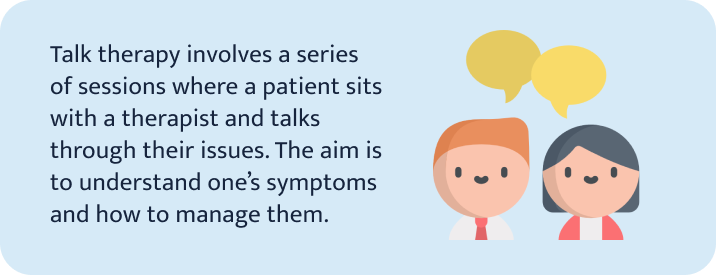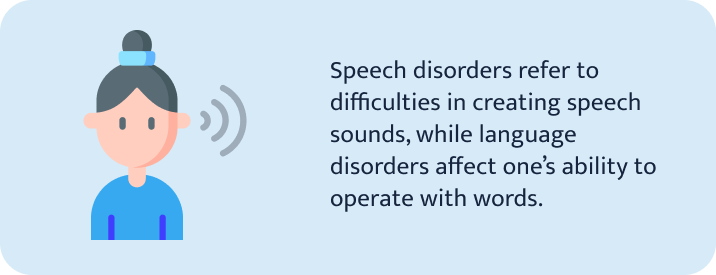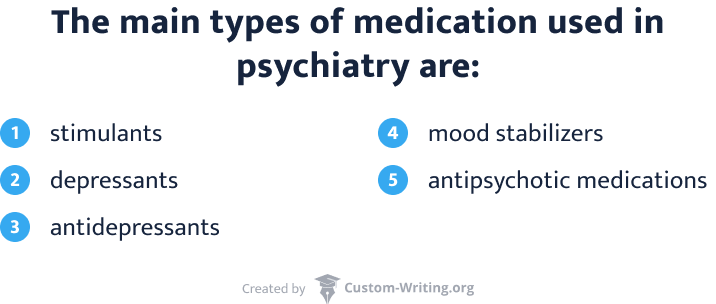How do mental health disorders develop? Which biological and environmental factors influence mental illnesses? How can medications and therapy work together? Psychiatry research topics explore these and many other critical questions to advance our understanding of mental health.
This article, created by Custom-Writing.org contains a collection of interesting topics in psychiatry, psychology, and mental health. It explains the distinctions between these disciplines, outlines their key areas of study, and presents current psychiatry research topics suitable for papers, theses, or presentations. If you’re a medical student or researcher captivated by psychology or psychiatry topics like those mentioned above, check out more ideas below.
- ⭐ Top 10 Psychiatry Research Topics
- 🏥 Psychiatry Topics for Medical Students
- 💡 Interesting Topics in Psychiatry
- 📌 Psychiatry Presentation Topics
- 🔝 Mental Health Research Questions for High School
- 💊 Topics on Substance-Related Disorders
- 🍴 Mental Health Research Topics on Eating Disorders
- 🎓 Mental Health Topics for College Students
- 😨 Research Topics on Anxiety Disorders
- 🎭 Mood Disorders Research Topics
- 🧠 Neurodevelopmental Disorders Topics
- ❓ Mental Health Research Questions
- 🔥 Other Psychology Topics
- 📚 Fields of Research
- 🤔 How to Write a Research Question
- 🔍 References
⭐ Top 10 Psychiatry Research Topics
- Sleep patterns in BPD
- Diabetes: comorbid disorders
- Cannabis use and schizophrenia
- Manic episodes in bipolar teenagers
- Bipolar disorder and risky behaviors
- Catastrophic thinking in older patients
- Bereavement-related depression treatment
- Factitious disorder in single-parent families
- Effects of media on gun-related violence
- Effects of pandemics on cognitive disorders
🏥 Psychiatry Topics for Medical Students
Do you need to write a research paper on psychiatry? Bear in mind that a key to a successful essay is a thought-provoking topic. Below you’ll find a list of the most effective psychiatry topics for research papers:
- The influence of tobacco addiction on human brain activity.
- Review the most effective ways of treating schizophrenia.
- Obsessive-compulsive disorder: treatment and prevention.
- Why is ADHD more often diagnosed among children than adults?
- What’s the difference between perfectionism and OCD?
- The impact of the COVID-19 pandemic on people’s mental health.
- Why shouldn’t we ignore the symptoms of depression?
- Unhealthy relationships in a family as a cause of children’s mental disorders.
- What are the key factors that provoke depression?
- Are LGBTQ people more vulnerable to psychiatric disorders?
- Ways to prevent the development of mental illness.
- Bipolar disorder: causes, treatment, prevention.
- How can we prevent addiction to sedatives?
- Assess the role of parents in the treatment of teen anorexia.
- Bulimia nervosa: symptoms and causes.
- Life after drug addiction: is it possible to get back to normal life?
- Depression in women: causes and effects.
- Study the comorbidity of social anxiety disorder with OCD.
- Brain aging as a cause of mental disorders development.
- Back to WWII: disorders in concentration camp captives.
- Discuss the neurologic effects of COVID-19.
- When does insomnia become a dangerous disorder?
- Postpartum depression as the most common disorder among first-time mothers.
- Side effects of medications used for psychiatric disorders treatment.
- The use of classical music to treat mental illness.
- What are the most effective methods to overcome ADHD in childhood?
- Epileptic disorders: diagnosis and treatment.
- Evaluate the potency of talk therapy against suicidal thoughts.
- Obesity as a cause of anxiety and depression.
- Can the lack of sleep lead to anxiety?
- Parental divorce as a cause of a child’s depression.
- Stress at the workplace increases the risks of mental disorders.
- What’s the role of genetics in mental illness development?
- Newborn hearing test as a tool for early autism detection.
- The adverse side effects of prolonged antidepressant treatment.
- Cyberbullying as a cause of depression among teenagers.
- How can alcohol abuse in women be overcome?
- Can a healthy lifestyle decrease the risk of ADHD development?
- Generalized Anxiety Disorder: symptoms and medical treatments.
- Rules everyone should know to prevent mental health disorders.
Psychiatric Nursing Research Topics
Nursing students should be ready to face a lot of challenges. To be fully prepared, take the maximum advantage from studying. Do you need to write an essay on mental health nursing? We have some fascinating topic ideas to choose from.
- Nursing ethics: aspects that a future nurse should know.
- Assess the significance of compassion for psychiatric nurses.
- What virtues should every psychiatric nurse possess?
- The application of psychopharmacology in psychiatric nursing.
- Review the challenges of geriatric psychiatric care.
- Starting your nursing career: what every intern should know.
- How to understand whether you are ready to become a psychiatric nurse.
- Discuss the use of nurse navigation for behavioral health.
- Mental illnesses among psychiatric nurses.
- The role of a nurse in the patient’s effective recovery.
- What are the main aspects of dealing with people exposed to trauma?
- How can a psychiatric nurse take care of their own mental health?
- Nursing staff shortage: reasons, effects, strategies to promote nursing.
- Evaluate Gibbs model for the reflection on psychiatric nursing placement.
- Newly-developed approaches for effective mental health nursing.
- The significance of evidence-based research methods in psychiatric nursing.
- Practical application of modern technologies in psychiatric nursing.
- The role of highly-skilled nurses in clinical psychology practices.

- How does burnout syndrome affect mental health nursing?
- Ways of establishing partnership between a patient and a nurse.
- Review the concept of anti-stigmatization in nursing literature.
- Nursing theory development and its fundamentals.
- Discuss psychiatric nursing career opportunities.
- Use of nurse navigation systems for mental health services.
- Compare nursing practices used to treat children and adults.
- What advice would you, as a psychiatric nursing student, give to people?
- Forbidden psychiatric nursing practices: an overview.
- Write about the methods of dealing with aggressive patients.
- Why isn’t psychiatric nursing a popular occupation among men?
- The limits of the responsibility mental health nurses take for their patients.
- Stigmatization and dehumanization practices used by psychiatric nurses.
- The importance of self-discipline for nurses working in the psychiatry field.
- Review the benefits and drawbacks of mental health nursing career.
- What are the mental health risks of working with psychiatric patients?
- The development of the professional identity of nursing students.
- Study the methods to understand nursing in psychiatric inpatient care.
- What are the factors of compassion fatigue among psychiatric nurses?
- Emotional support and extended vacation for mental health nurses.
- The challenges of working as a nurse in psychiatric inpatient care.
- Evaluate knowledge and skills crucial for mental health nursing.
Recent Research Topics in Psychiatric Nursing
In psychiatric nursing practice, there are a lot of urgent problems that require detailed research and attention. The list of such issues includes the following topics:
- The stigma around mood disorders in the workplace.
- The role of psychiatric nurses in educating patients about self-care.
- How is telemedicine used in treatment of schizophrenia?
- What factors lead to bias and discrimination in the mental health field?
- Ethics and professional standards in mental health nursing.
- The efficiency of personalized clinical approaches to anxiety disorders.
- Racial and gender stigma in the context of mental health.
- How does sugar affect the symptoms of depression?
- The possible risks of dual diagnosis.
- The impact of childhood trauma on sexual health and relationships.
- The role of nurses in supporting families of patients with mental disorders.
- Structural discrimination in access to mental health services.
- Study the prevalence of dual diagnoses among children.
- How does mindfulness influence the symptoms of OCD?
- Evaluate strategies for effective communication with patients with antisocial disorder.
- How do family factors affect the course of treatment of patients with autism?
- Medication adherence and its significance in mental disorder treatment.
- The influence of stress on the mental health of psychiatric nurses.
- How media contributes to creating stigma around personality disorders.
- Is EMDR therapy effective for trauma survivors?
- Peculiarities of care for children and adolescents with avoidant personality disorder.
- Trauma-informed care and its role in mental illness treatment.
Psychiatry Thesis Topics
Psychiatry is a medical specialty that focuses on the diagnosis, prevention, and treatment of serious mental illnesses. Below, you can find the hottest thesis topics on psychiatry:
- The risk factors of postpartum depression.
- Evaluate the use of experimental drugs in autism treatment.
- Explore the neuroanatomic variability associated with ADHD using MRI.
- What are the most effective methods of accessing suicide risk factors in patients with bipolar disorder?
- Study the neurobiology of anxiety disorders.
- The relationship between physical health and mental disorders in older adults.
- Mood disorders among children in high school.
- Assess the effectiveness of cognitive behavioral therapy in treating addiction.
- The impact of climate change on the mental health of the American population.
- The ethics of the use of psychotropic drugs in child psychiatry.
- The role of hormonal changes in the development of mental disorders in women.
- The three Ds of geriatric psychiatry and their comorbidity.
- The influence of housing prices and affordability on mental health.
- Psychopharmacological treatment of fetal alcohol spectrum disorders.
- How do cultural differences affect treatment strategies of mental disorders?
- The efficacy of new psychedelic drugs for the treatment of CPTSD.
- Psychosis in patients with systematic lupus erythematous.
- The role of neuroplasticity in the treatment of post-traumatic stress disorder.
- Behavioral patterns in patients with obsessive-compulsive disorder.
- How do meditation, visualization, and focused breathing reduce the hyperarousal of the fight-or-flight response?
- Demographic profile of a patient with schizophrenia and depression.
- Genetics and its role in schizophrenia spectrum disorders.
Choosing a compelling psychiatry thesis topic is only the first step in crafting a strong research paper. You also need to develop a clear argument, analyze relevant studies, and present your findings in a structured way. If you want to refine your ideas or ensure your paper meets academic standards, Custom-Writing.com offers expert assistance on psychiatry and psychology topics from TOP American and Canadian universities’ graduates.
Research Topics in Psychiatry
Although research in psychiatry continues to expand, our understanding of mental illnesses is still lacking. That’s why there’s always a need for more research into this field. Below, we have collected the best research topics for you to choose from:
- The molecular mechanisms in psychiatry and their characteristics.
- Recovery-oriented services for people with substance use disorders.
- What is the role of gut microbiota in mood regulation?
- Study the link between anxiety disorders and heart disease.
- The impact of sleep disorders in children on brain development.
- Research the root causes and symptoms of OCD in children.
- Assess the efficiency of virtual reality use in treating anxiety disorders.
- How does caffeine consumption increase anxiety levels?
- The impact of the COVID-19 pandemic on older adults with mental health disorders.
- What is the role of domestic violence in psychosis development?
- Study the influence of marijuana legalization on substance abuse rates.
- How does social media promote eating disorders?
- The effectiveness of antipsychotic medication in hallucination treatment.
- What are the signs and interventions in adolescent psychosis?
- The efficacy of using emotional support animals in treating PTSD.
- What are the root causes of challenging behaviors?
- The biological basis of binge-eating disorder.
- Cognitive behavioral approach in treating OCD.
- The impact of social media and technology on body dysmorphia rates.
- Evaluate the influence of childhood trauma on borderline personality disorder.
- The importance of community-based care for psychotic disorders.
- Assess the strategies for preventing suicide among veterans with PTSD.
💡 Interesting Topics in Psychiatry
While psychiatry is often associated with medication and therapy, it is a much broader domain filled with interesting and underresearched topics. Check some of them below:
- The use of adjunctive antidepressants for bipolar disorder treatment.
- Gender aspects of mood disorders.
- Is aromatherapy effective for treating anxiety disorders?
- Study the link between cannabinoids use and mental disorders in adolescents.
- Peer pressure and its role in psychiatric issues development among teenagers.
- The effectiveness of using virtual assistants in psychotherapy.
- The role of life-changing events in development of anorexia nervosa.
- The risks of using ketamine for treatment-resistant depression.
- How do toxic relationships lead to social anxiety?
- Psychiatric aspects of the use of artificial antibodies in the treatment of depression.
- The impact of self-regulation strategies on body dysmorphic disorder.
- What is the relationship between diet and mental health?
- The function of art in the treatment of mental disorders.
- The efficiency of animal-assisted therapy for adults with ASD.
- Nurse-delivered brief behavioral treatment for insomnia and its efficiency.
- The socioeconomic triggers of major depressive disorder.
- How are the education level and mental health related?
- The “distraction-avoidance” pattern in patients with PTSD
- How does mental illness impact people’s social relations in workplace?
- The issue of growing mental health crisis in young adults.
- The connection between childhood trauma and adult mental health.
- The effectiveness of dialectical behavior therapy for people with bipolar disorder.
📌 Psychiatry Presentation Topics
Learning more about psychiatry is much easier with visuals such as photographs, tables, diagrams, and videos. Use our intriguing topics for presentation to illustrate the most trending issues in mental health:
- How to identify self-harm behaviors.
- Demonstrate ways of detecting the key symptoms of anxiety.
- Physiology of stress and its peculiarities.
- Psychodynamics of narcissistic personality disorder.
- Cultural variations in eating disorders.
- Trace the mood dynamics in a person with bipolar disorder.
- Eating disorders and their key types.
- Explain visual and auditory hallucinations of schizophrenia.
- What are the root causes of depression?
- Molecular structures of psychotropic drugs.
- The advantages and disadvantages of telemedicine in psychiatry.
- How do sleep cycles affect the symptoms of PTSD?
- Demonstrate effective strategies for recognizing a person with narcissistic personality disorder.
- Neurobiological evidence for psychotherapy’s effectiveness.
- The role of serotonin in mood regulation.
- Describe the signs and symptoms of avoidant behavior.
- Mechanisms of action of psychotropic drugs.
- What characterizes the development of children with ASD?
- How does the brain respond to trauma-focused psychotherapy?
- Suggest ways of improving the diagnostic criteria for DID.
- The clinical picture of a confused patient.
- Mild intellectual disability and psychiatric comorbidities.
🔝 Top 10 Research Questions about Mental Health for High School
- What causes psychosis?
- Is therapy efficient for DMDD?
- What are ADHD symptoms in adults?
- Can OCD symptoms ease over time?
- How can stimulant addiction be avoided?
- What conditions can antidepressants help with?
- What distinguishes children’s reaction to trauma?
- What are genetic factors for developing schizophrenia?
- What are the side effects of electroconvulsive therapy?
- Why is bipolar disorder typically diagnosed during late adolescence?
While some of the topics in this section, such as ADHD symptoms, are commonly discussed, others, such as therapy for DMDD, are more specialized and require a thorough evaluation of scholarly sources. Regardless of the complexity of your assigned topic, you may find yourself stuck—whether due to unfamiliarity with the subject or a lack of time and energy for deep research. If that sounds like you, consider using our psychology essay writing service. Seasoned experts with relevant degrees will help you tackle any psychology-related task.
💊 Mental Health Research Topics on Substance-Related Disorders
Substance abuse remains a pressing issue in the field of mental health. Here are some interesting research ideas you may explore in your next assignment.
- Opioid crisis evaluation. What contributes to an ongoing opioid crisis in the US? What are its signs?
- Age-related differences in substance abuse. Examine substance use trends and patterns across various age groups.
- Health implications of substance abuse. Discuss the impact of chronic substance use on major organs and body systems.
- Comorbidity of substance abuse in mental health. What mental health diseases co-occur with substance abuse? How can this comorbidity be addressed?
- Drug use reduction programs. What strategies to minimize drug abuse harm may be taught to people with a substance use disorder?
- Educational interventions for substance use risk reduction. Examine the propriety of introducing substance abuse educational programs at schools. Look into the effectiveness of such programs.
- Drug legalization policies and their implications. How do policies like marijuana and cocaine legalization affect health outcomes and substance abuse rates?
🍴 Mental Health Research Topics on Eating Disorders
Eating disorders often cause chronic stress and harm to patients experiencing them. Use this list of topic suggestions to explore this subject in depth.
- Social media and body image. How do Instagram and TikTok influencers affect teens’ body image and cause eating disorders?
- The impact of family on eating disorder risks. Investigate the role of family communication and parental expectations on children’s risks of developing eating disorders.
- Genetic causes of eating disorders. Are there genes responsible for eating disorder risks?
- Are athletes prone to eating disorders? Discuss athletes’ pressure to conform to a specific physical form and coaches’ influence on the healthiness of their diets.
- Evidence-based approaches to treating eating disorders. What therapeutic interventions have proven effective in treating various eating disorders?
- Gender and eating disorders. Are males diagnosed with eating disorders on a lower scale, and what biases come into play?
- The role of culture in eating disorders. Evaluate cultural differences in beauty standards and body image expectations.
🎓 Mental Health Research Topics for College Students
- PTSD: reflection and denial
- Seasonal mood changes
- Cognitive biases in marketing
- Gender differences in ADHD
- Effectiveness of mental health apps
- Treating addictions via telehealth
- Types of parasomnias
- Mindfulness in burnout treatment
- Resilience and geriatric mental health
- CBT’s effectiveness for panic disorders
😨 Mental Health Research Topics on Anxiety Disorders
Anxiety is common among people living hectic, busy lives. In severe cases, it may turn into a clinically troubling disorder that should be adequately addressed. Here are the most interesting suggestions for examining this mental issue more closely:
- Exposure therapy. Discuss the use of exposure methods to treat various phobias and consider individual responses to these interventions.
- Mindfulness practices for anxiety management. Report on the usefulness of mindfulness practices like yoga and meditation on the individuals’ stress levels.
- Dealing with childhood anxiety. How can an anxiety disorder be identified in children? What interventions exist for this age group?
- Health implications of chronic anxiety. What effects on organs and biological systems does chronic stress produce? Discuss its links to diabetes and heart disease.
- Higher exposure to anxiety among LGBTQ+ individuals. Study the prevalence of anxiety disorders in the LGBTQ+ community and explore the factors that contribute to higher risks.
- Economic impacts of untreated anxiety. How does chronic anxiety undermine people’s economic capacity and earning potential?
- Caffeine and anxiety. Examine the evidence of caffeine’s contribution to elevated anxiety.
🎭 Mental Health Research Topics on Mood Disorders
Having a mood disorder can severely affect one’s quality of life and social functioning. Use this list of topics to understand this type of mental health disorder better:
- Effective treatments for depression. Discuss the available evidence on CBT and antidepressants to determine which method is more effective for depression.
- Impact of microbiome on mood. Is gut health the key to managing people’s moods?
- Seasonality in mood changes. Examine the impact of seasonal changes on the state of people with mood disorders.
- Chronic illnesses as depression contributors. Evaluate the connection between chronic physical health issues and mood disorders.
- Postpartum depression management. Study the relationship of childbirth to mood disorders, with a specific focus on postpartum depression.
- Physical exercise for mood disorders. Can physical activity alleviate mood disorder symptoms and their severity?
- Suicidality in mood disorders. Discuss the available evidence on preventing suicide in patients with severe mood disorders.
🧠 Mental Health Research Topics on Neurodevelopmental Disorders
Understanding neurodevelopmental disorders’ risks, causes, and patterns can lead to better and timelier interventions. Look through these research ideas to find an interesting direction for your study.
- Early ASD interventions. How can early ASD diagnosis and treatment planning improve the patient’s health outcomes?
- Parental support for patients with neurodevelopmental issues. What parental coping strategies are effective in raising children with neurodevelopmental challenges?
- Dietary interventions for ADHD. How can dietary adjustments alleviate ADHD symptoms?
- Gender differences in autism. Examine the gender distribution of ASD diagnoses.
- The impact of ADHD on sleep quality. Study sleep disorder’s comorbidity in patients with ADHD and offer effective interventions.
- Managing neurodevelopmental disorders of delinquents. How are neurodevelopmental disorders affected in the criminal justice system? What reform is needed to avoid criminality and recidivism?
- School stigma for children with ASD and ADHD. Examine the prejudice and bias towards children with ASD and ADHD in school settings. Propose educational interventions for dealing with them.
❓ Mental Health Research Questions
The multifaceted nature of mental health makes it one of the most complex areas of medicine. Check out this list of topics that can inspire further research and open up new insights into the fascinating world of mental health:
- What is the role of family history in psychotic disorders?
- What signs of narcissistic personality disorder do business executives have?
- How does OCD impact patients’ family dynamics?
- How effective is group therapy for C-PTSD patients?
- How can AI help diagnose, treat, and predict mental disorders?
- How do economic policies affect citizens’ psychological stability?
- How does a positive self-image contribute to mental health resilience?
- How can parents identify depression and anxiety in their children?
- Is the human brain capable of self-healing from trauma?
- How do various learning disabilities impact a student’s academic achievement?
- What are the latest discoveries regarding the neural basis of tics?
- How can traumatic experiences provoke suicidal behavior?
- What are the early warning signs and diagnostic criteria for Alzheimer’s disease?
- How does stigma impact the mental health disparities among LGBTQ+ individuals?
- Is genius a form of mental disorder?
- What role does society play in supporting persons with mental health issues?
- How do cultural beliefs around femininity influence the mental health of women?
- How can communities raise awareness about prescription medication assistance programs?
- How does mental health affect physical health?
- What difficulties do people with Tourette’s syndrome face in social and academic contexts?
- How do vegetarian and vegan diets impact mental health and well-being?
- How effective is buprenorphine formulation for opioid use disorder treatment?
🔥 Other Research Topics on Psychiatry & Psychology
Developmental & Children Psychology Topics
Do you want to know what processes occur in our brain throughout the lifespan? Consider writing a research paper in developmental psychology! You will find the most outstanding essay ideas below:
- How does excessive discipline affect a child’s development?
- The formation of new behavior forms from the classical behaviorist perspective.
- Assess the use of play therapy in counseling preschool children.
- Respondent and operant learning: resemblances and differences.
- Expand on the theory of social learning by A. Bandura.
- Nature and nurture: which one prevails?
- How do people with different levels of ego development interact?
- The overall behavioral approach in the study of mental development.
- Discuss Freud’s stages of psycho-sexual development.
- Freud vs. Klein: a comparison between psychoanalysis approaches.
- What is the practical application of Erickson’s epigenetic concept?
- Study the stages of memory development in infants.
- Review Jacques Lacan’s mirror stage theory.
- Maslow’s unacknowledged contributions to developmental psychology.
- Analyze Erik Erikson’s stages of psychosocial development.
- Evaluate the role of art in children’s cognitive development.
- What factors can influence attachment in infants?
- Analyze the effects of listening to classical music during pregnancy.
- What is the role of physical activities for one’s mental development?
- Study the impact of attachments on children’s emotional development.
- How does social media influence teenagers’ psyche?
- What are the psychological mechanisms behind speech development?
- How do children learn to think logically?
- Review the milestones of mental development throughout the lifespan.
- What factors prevent an effective cognitive development of a person?
- Discuss the effects of aging on brain functioning.
- What are the distinctive features of bilingual brain development?
- Is there a correlation between fine motor skills and one’s intelligence?
- What factors influence one’s self-esteem from childhood to adulthood?
- Is homosexuality an inborn or a developed feature?
- Analyze Freud’s explanation of partiality and fetish.
- Explain the phenomenon of egocentrism during the preoperational stage.
- The evolution of humanity through the lens of developmental psychology.
- What external factors influence prenatal development?
- The influence of parenting style on the adolescent academic performance.
- Discuss the issue of continuity in psychological development.
- What are the differences in brain development between children and adults?
- Review the most common learning disabilities.
- Piaget’s theory of cognitive development: explanation, examples, practical implications.
- The problem of loneliness during early adulthood.
Cognitive Psychology Research Topics for Papers
Knowing the basics of cognitive psychology is beneficial for everyone. This subfield can explain how your brain works and how to memorize information. If you’re looking for possible research topics, check out these ideas:
- The role of memory capacity in preschool children development.
- Assess the use of neural networks for studying visual memory.
- Cognitive neuroscience foundation of individual differences in categorical learning in school children.
- Analyze the link between mental attention capacity and eye-tracking.
- What can be done about stereotypes related to Autism Spectrum Disorder?
- Sample-test spatial adjacency in visual working memory.
- Study olfactory effects on cognitive performance.
- How can people with SAD cope with unpleasant memories?
- Compare the aspect of visual short-term and long-term memory.
- The role of memories in the impostor syndrome development.
- How can occupational therapy increase independence for autistic adults?
- Discuss similarity effects in visual working memory.
- What influence color psychology has on cognitive development studies?
- Is there a correlation between bilingualism and creativity?
- Study the cognitive foundations of emotion regulation.
- How does cognitive psychology help people with attention disorders?
- Evaluate the role of the hippocampus in semantic memory.
- What are the methods to measure the attention span?
- What techniques can help one develop problem-solving abilities?
- How to prepare for exams effectively: cognitive methods.
- How does working memory overload cause difficulties in the decision-making process?
- Ensemble perception and visual working memory.
- How does our subconscious affect the decision-making process?
- Top-down processes in human brain activity under information overload.
- Explore the correlation of grammar and cognition.
- Semantic memory VS. episodic memory.
- What are the decision-making phases?
- Review the cognitive mechanisms of the Banner Blindness phenomenon.
- Memory loss: possible causes and effects.
- What are the adverse effects of ADHD on one’s mental development?
- How can a person with autism succeed in their career path?
- Assess the role of positive memories in one’s behavior.
- Discuss the ways of developing critical thinking skills in children.
- Provide a typology of speech disorders.

- Write a comparison of unconscious mind vs. subconscious mind.
- What cognitive processes occur during an impulsive purchase?
- Analyze Freud’s topographical model of the mind.
- What are the implications of procedural memory in real life?
- How would our brain operate if there was no cortex?
- Trace brain transformation linked to aging.
Researchable Topics in Biopsychology
Are you wondering how our bodies influence our emotions and behavior? The field of biopsychology explores these issues. It can answer all of your questions! Here are some research topics in biological psychology:
- Discuss the neurobiological mechanisms of human social behavior.
- Assess the role of neurobiology in learning processes.
- What are the biological rhythms?
- What processes occur in your nervous system when you are happy?
- Study the correlation between the nervous and endocrine systems.
- What is the function of GABA in brain operation?
- Review Rene Descartes’ contribution to biopsychology.
- Explore the concept of the Hawthorne effect.
- Why should immunology be studied alongside neurology?
- Study the effect of endorphin release on a person’s mood.
- Assess the adverse effect of drugs on the neurotransmission process.
- The role of cognitive neuroscience in the development of psychology.
- Explore the psychosomatics of an organism’s general well-being.
- Research the aspects of mathematical modeling of social behavior.
- How do increased serotonin levels influence one’s behavior?
- What mental disorders are related to neurotransmission defects?
- Study the biological processes behind Alzheimer’s disease.
- Analyze the results of the Bobo Doll experiment.
- The division of the nervous system.
- Love: what hormones are responsible for this feeling?
- The importance of the famous case of Phineas Gage for future psychological experiments.
- Why do some people eat chocolate in stressful situations?
- Study the biological explanations of epilepsy.
- The effect of technological development on organic psychology.
- Can neuroscience change people’s perception of morality?
- What’s the relationship between one’s mental and physical worlds?
- Why do some scholars critique biological psychology as a science?
- What organic processes influence the feeling of parental attachment?
- Four lobes of the brain: what is each one responsible for?
- Explain the fight-or-flight response from the neurological perspective.
- Why do we tremble in scary situations?
- Healthy person vs. one with schizophrenia: differences in nervous system processes.
- Nanomedicine and neuroscience: benefits, limitations, and safety issues.
- What processes are involved in operant conditioning?
- Study the biological processes that occur during a panic attack.
- Evaluate enormous amounts of dopamine as a cause of schizophrenia.
- How does alcohol damage the nervous system?
- Back in history: the most unethical experiments in biological psychology.
- Review BF. Skinner’s contribution to the development of biopsychology.
- What’s the role of the hypothalamus in the nervous system functioning?
Health Psychology Topics to Explore
Did you know that a negative state of mind can provoke some illnesses? Have you heard of using psychological methods to treat diseases? The field of health psychology has much more insights to share with you! Find some helpful ideas for your research paper below:
- Study the link between psychology and medicine.
- How can mental conditions impact one’s physical well-being?
- Psychological attributes of people predisposed to cancer.
- How can yoga help to reduce the risk of a heart attack?
- Mental well-being: hedonic and eudaimonic approaches.
- The role of a woman’s mental state during the process of childbirth.
- What are the effects of believing medical conspiracy theories?
- Study the psychological aspects of recovering from a severe disease.
- How not to get preoccupied with anxiety during a global pandemic.
- A flip side of cancer: how to accept a new reflection in the mirror after chemotherapy.
- Discuss the psychological impact of HIV.
- What are the reasons behind emotional eating?
- The effect of a pregnant woman’s mental state on fetus’ development.
- How can a couple overcome a miscarriage on a psychological level?
- Discuss stress as the leading cause of a stroke.
- Can stressful work result in diabetes development?
- What’s the role of psychological support for cancer patients?
- How can psychology boost the process of recovering from an addiction?
- Review the history of health psychology.
- How did health psychology help increase average life expectancy?
- Healthy lifestyle promotion as the primary focus of health psychology.
- Psychological methods to overcome depression in cancer patients.
- How can health psychologists help psychiatric nurses to deal with stress at work?
- The role of health psychologists for motivating people to make better health choices.

- How can health psychology help in disease prevention?
- Study effective cognitive methods to reduce stress levels.
- What psychological techniques help to maintain a healthy weight?
- Explain the need for health psychologists in the contemporary world.
- Analyze the biosocial model of health psychology.
- How can psychological practices adjust to chronic illnesses?
- What factors may provoke the development of anorexia?
- Study the psychological techniques to quit smoking.
- How does exposure to unrealistic images in advertisements lead to eating disorders?
- The influence of parents’ willingness to have a child on a baby’s physical health.
- What psychological techniques can help reduce pain?
- Discuss the adverse effects of depression on heart health.
- Research psychological interventions in cancer treatment.
- Study the psychological factors that can lead to chronic bronchitis.
- Assess the role of psychological support in end-of-life care.
- The correlation of sleep quality and general well-being.
Sports Psychology Research Topics
Sports psychology is a relatively new branch. Yet, it’s becoming increasingly popular. Do you want to explore sports psychology and its role for athletes? How about writing an essay or making a presentation on this topic? We prepared some ideas for you:
- What external factors influence the psychological well-being of athletes?
- Sports activities as a tool for mind refreshment.
- Psychological methods of improving one’s concentration during competition.
- How can mindfulness help athletes?
- Goal-setting as a key to a successful sports career.
- How can you take maximum advantage of sports on a psychological level?
- What characterizes a winner’s state of mind?
- Athletes’ adaptation in society after the end of their sports career.
- How can a mental image of a victory help to become a winner in reality?
- How do injuries harm athletes’ psychological health?
- Evaluate meditation as a way to get ready for a competition.
- What’s the role of sports psychologists in increasing athletes’ motivation?
- Compare extrinsic and intrinsic motivation in sports.
- What are the psychological techniques of effective team building?
- Explain the need for cooperation between psychologists and coaches.
- How can athletes cope with the intense pressure before a competition?
- What characterizes burnout in athletes?
- Present mental exercises to reduce pre-competition anxiety.
- Review the ways of increasing athletes’ self-esteem.
- Evaluate the lack of rest as the key cause of burnout.
- Present the most effective post-competition relaxation techniques.
- How to reduce tension in a team by applying psychological methods.
- Study post-injury rehabilitation process and psychologists’ role in it.
- The application of psychotherapeutic approaches in sport psychology.
- Review the cultural aspects of sport psychology counseling.
- How can one deal with the negative feelings after an injury?
- Evaluate the role of work-life balance for the mental state of sportspeople.
- The International Society of Sport Psychology (ISSP) and its contribution to global sports.
- Research the history of sports psychology.
- Assess the influence of family problems on athletes’ performance.
- How can you help athletes overcome losses and move forward?
- Coleman Griffith: the first American health psychologist.
- Is a loss the end of one’s sports career or a motivation to improve?
- Compare the work of educational and clinical sports psychologists.
- Participant, interactional, and situational theories and their role in motivation.
- The role of coaches’ mental health literacy in raising professional athletes.
- Review the techniques associated with motor learning.
- How can one cope with insomnia before a competition?
- Study the ways of managing career transitions in athletes.
- What are some ways to enhance athlete engagement in sport psychology practices?
Hot Topics in Forensic Psychology to Research
Are you interested in what psychological aspects lie behind crimes? Do you want to explore the connection between the human mind and law? Forensic psychology explores these issues and provides valuable insights. In case you cannot come up with a topic for your forensic psychology research paper, check out these ideas:
- What are the ethical norms in forensic psychology practices?
- How do you deal with controversies in criminal justice?
- Assess bias in forensic psychological expertise in insanity cases.
- What defense mechanisms characterize repeat offenders?
- Describe the use of forensic psychology in the US criminal justice system.
- Unethical decision-making in forensic psychology.
- What are the psychological factors of criminal behavior in juveniles?
- Study the sources of unreliability in forensic psychological evaluations.
- How are psychological explanations of a murderer’s intentions given?
- Give practical solutions to forensic contextual bias.
- Assess the percentage of accurate eyewitness testimony.
- Review the norms of labeling in forensic/correctional psychology.
- Harming someone in self-defense: should the person be sentenced or not?
- What are the main reasons behind evidence falsification?
- Can defense attorneys detect forensic confirmation bias?
- What are the ways of obtaining informed consent for a custody evaluation?
- Review evidence-based substance abuse treatment.
- How can you use interviews for PTSD assessment?
- What are the peculiarities of counseling victims of crime?
- Study the issue of memory biases in forensic psychology practices.
- What characterizes crimes committed under temporary insanity?
- Research religious views on the death penalty.
- What role does unconscious transference play in crime investigation?
- Describe the link between neuropsychology and forensic psychology.
- Review the guidelines for juvenile offenders’ treatment.
- What challenges of fact misinterpretation do forensic psychologists face?
- Present the professional competencies in forensic psychology.
- What are the psychological consequences of sexual abuse?
- Describe the principles of death notification procedures.
- Research system variables in eyewitness identification.
- How do you assess the reliability of forensic decisions in criminal court?
- Evaluate the role of forensic mental health professionals in solving crimes.
- Analysis expert performance applied to forensic psychological assessments.
- What skills are essential for forensic psychologists?
- Compare legal psychology vs. forensic psychology.

- What are the competing ethical paradigms in forensic psychology?
- How can you detect a possible inaccuracy in eyewitness descriptions?
- What is the concept of a “guilty mind” in forensic psychology?
- Research the impact of stress on eyewitnesses’ memory.
- What techniques are used for mild traumatic brain injury assessment?
Psychology Survey Topics for Students
Surveying is one of the most popular activities psychologists perform. If you study psychology, you are likely to have such an assignment. Are you searching for some ideas? Take a look at our psychology survey topics:
- Gender inequality ratio and the level of sexism in your state.
- Percentage ratio between men and women suffering from eating disorders.
- Personal and environmental factors of goal achievement for teenagers.
- Emotional intelligence impact rate on employee performance.
- What percentage of adolescents in your area have ever had suicidal thoughts?
- Social media addiction rates among teenagers in your city.
- Determine the correlation between shared leadership and workgroup efficiency.
- Depression rates among teenagers in the USA.
- Assess the impact of self-confidence on athletes’ performance.
- Levels of drug addiction and mental health disorders comorbidity.
- Is alcohol abuse a cause of anxiety or its result?
- Academic performance levels among children with autism.
- What’s the effect of meditation on anxiety rate?
- Find the correlation rates between obesity and depression.
- To what degree does physical appearance impact teenagers’ self-esteem?
- Study the connection between mental and physical health.
- Study the rates of domestic violence in the USA.
- What’s the proportion of current and recovered drug addicts in your area?
- The percentage of people with OCD working in the software development industry.
- How does poor quality of sleep affect students’ academic performance?
- Compare stress levels among the graduates of your university.
- Determine the percentage of women who faced workplace discrimination.
- Percentage of the US population whose mental health was affected by the COVID-19 pandemic.
- The ratio between men and women suffering from Narcissism in your state.
- Compare the numbers of children and adults with ADHD in your city.
- Analyze the correlation of stress and job performance among Apple employees.
- Compare the motivation rates before and after financial reward among McDonald’s workers.
- How many teenage girls in your city are suffering from an inferiority complex?
- How does job performance depend on rest quality for the workers in the healthcare industry?
- To what extent the teenagers in the US are predisposed to domestic violence?
- The rate of children with obesity caused by high stress levels in Canada.
- Study the percentage of Asian women who face racial discrimination in the US.
- Determine the ratio of cancer survivors with mental health disorders.
- What percentage of American teenagers regularly suffer from panic attacks?
- The rate of children born with autism in Canada during the recent decade.
- Determine the percentage of consumers influenced by a marketing technique of providing coupons: a case study.
- What is the percentage of social media users in Canada experience FOMO?
- The rate of police officers who have bipolar disorder in the US.
- What is the percentage of car crash participants who have PTSD?
- Study the number of primary school teachers suffering from Acute Stress Disorder.
Experimental Psychology Research Topics
Have you ever heard of Pavlov’s dogs or the Stanford Prison experiment? These are the famous psychological studies that apply theories in practice. As a psychology student, you’ll probably need to analyze the existing experiments or develop your own one. That’s why we prepared some outstanding ideas for you!
- Pavlov’s dogs and the explanation of classical conditioning.
- The Little Albert experiment (1920): can humans be conditioned to enjoy or fear something?
- The fundamental findings of the Milgram experiment.
- M. Seligman’s study of 1965: can helplessness be learned?
- Discuss the unethical side of the Stanford Prison Experiment (1971.)
- Can music help to memorize information?
- The effect of colors used in advertisements on consumers’ buying behavior.
- What can one’s music preferences tell about their personality?
- Can animal-assisted therapy reduce anxiety?
- What’s the impact of sleep deprivation on one’s discipline?
- Why do people watch horror movies?
- Explain the phenomenon known as the “bystander effect.”
- Can social media exacerbate an inferiority complex?
- Why do some students procrastinate?
- Review the Stanford Marshmallow Experiment and follow-up studies.
- How does caffeine impact human brain activity?
- Does compensation system increase employees’ performance?
- Does the lack of parental support affect one’s academic performance?
- Can upbeat music reduce stress levels?
- What do John B. Calhoun’s mouse experiments tell us about overpopulation?
- Does the text color increase readability for people with dyslexia?
- Discuss the results of the Good Samaritan Experiment (1973.)
- What are the elements of a successful experiment?
- Does dark chocolate boost brain activity?
- Study the reaction of neurotransmitters to stressful situations.
- Matthew Lieberman and his experiments in the field of cognitive psychology.
- Ethical and social norms of conducting a psychological experiment.
- Why do people prefer to remain anonymous while evaluating their supervisors?
- Extrinsic vs. intrinsic motivation: which one is more effective?
- Why do people sweat as they get nervous?
- What was discovered as a result of this Stroop test?
- The application of the Bayesian latent variable models for the analysis of experimental psychology data.
- What’s the effect of mood swings on one’s productivity?
- The criticism of the Monster Study (1939): how did it hurt the participants?
- Experimental approaches to study personality psychology.
- Can colors of walls in a room have an effect of calmness or irritation?
- Does overeating before sleep cause nightmares?
- Does alcohol help to overcome depression or exacerbates it?
- Violinist at the Metro Experiment (2007): the fundamental findings.
- To what extent are animal psychology experiments applicable to humans?
Research Topics in Psychology
Looking for more research topics on psychology? Check out the ideas below:
- Evaluate the emotional toll of social media comparison.
- The impact of positive psychology interventions on brain function and well-being.
- The psychology of the placebo effect and its characteristics.
- How does asynchronous communication influence empathy?
- Neurotransmitters and their role in regulating mood and emotions.
- The heterogeneity of psychiatric symptoms and disorders.
- Why is being alone harmful to mental health?
- Research the effects of mindfulness meditation on alcohol use disorder.
- The influence of background music on concentration and cognitive performance.
- What mechanisms underlie cravings and compulsions?
- Study the influence of laughter on the sensation of pain.
- The neurobiology of love and its effects on emotional well-being.
- What are the psychological benefits of practicing gratitude in daily life?
- The impact of positive self-talk on self-esteem and resilience.
- How do experiences become encoded and recalled?
- Trace the mechanism of developing a daily habit.
- Research the connection between personality traits and brain structure.
- What causes some individuals to experience cross-sensory perceptions?
- The psychophysiological response to acute and chronic stressors.
- Neurological aspects of learning and memory consolidation.
- Study the influence of virtual reality on spatial orientation.
- How does the human body prepare for danger?
Psychology Project Topics
The following project topics cover various aspects of psychology. Use them for exploration and analysis across multiple domains:
- Look into the differences between transient tic disorders and chronic Tourette’s syndrome.
- What are the psychological mechanisms behind the power of apology language?
- Research the issue of mental health disorders in discriminated groups.
- The effectiveness of marijuana in early-onset psychosis treatment.
- Trace the risk factors for developing schizoaffective disorder.
- How does the perception of time change under the influence of stress and anxiety?
- The psychological mechanisms of recovery from addiction.
- The link between diabetic neuropathy and depression.
- The psychological aspects of self-esteem.
- How can words influence people’s beliefs and actions?
- Assess the risks and benefits of prescription insomnia medications.
- How does goal ambiguity impact the psychological well-being of employees?
- The consequences of long-term psychedelic use.
- Evaluate the efficiency of using psilocybin mushrooms for managing anxiety.
- Research the cognitive processes involved in decision-making under uncertainty and risk.
- How do AI-edited images influence a person’s self-confidence?
- The effects of cyberbullying on a person’s levels of distress.
- The use of electroconvulsive therapy for depression treatment.
- Insomnia and its influence on workplace productivity.
- Neurological pain in relation to mental health disorders.
- The impact of chronic school stress on overall quality of life.
- How does the brain adapt and change in response to traumatic experiences?
📚 Fields of Research in Psychiatry
Psychiatry is a highly complex discipline that contains numerous subfields. Here are the main ones:
- Anxiety, mood, eating, and related disorders are studied in order to develop treatments for these common mental illnesses.
- Behavioral and psychosomatic medicine explores the connection between psychosocial and behavioral factors. It also studies how these factors influence people’s health.
- Brain aging and mental health is a subfield that examines the effects of aging on human brain activity.
- Child and adolescent psychiatry studies ways of treatment and prevention of psychiatric disorders in young people.
- Epidemiology applies a wide range of methods to study the distribution and determinants of mental illnesses in populations.
- Gender, sexuality, and health subfield analyzes the effect of gender and sexual orientation on one’s mental health.
- Neuroscience explores the structure of the human nervous system and its role in psychiatric conditions.
- Psychotic disorders research focuses on mental illnesses that result in abnormal thinking, perception, and behavior.
- Substance use disorders is a branch of psychiatry that focuses on the treatment of addictions.
All these fields of science are exciting and beneficial to study. Choose the one you like best, and use it as a starting point for your paper!
Social Psychology Research Topics for College Students
Social psychology studies the basis of our lives. It can explain different situations people get into without even realizing it. Do you need to come up with an exciting idea for your research paper? We’ve gathered a list of possible topics for you:
- What are the predominant issues of social psychology in the 21st century?
- Assess the link between social psychology and cognitive psychology.
- The socio-psychological influence on legal regulations of discrimination.
- Aggression in male offenders with an Antisocial Personality Disorder.
- Factors of perception of financial disparity in different social classes.
- Social influence psychology: norms, conformity, and compliance.
- Social prejudice towards the people in a tough economic situation.
- Prosocial behavior vs. antisocial behavior.
- Social Anxiety Disorder (SAD): recognition, diagnosis, and treatment.
- The influence of structural violence on one’s emotional security.
- Discuss self-identification within the framework of gender and sexual identity.
- The cognitive reasons behind racial prejudice.
- The Bystander Effect: definition, explanation, and prevention.
- Describe the ways of getting used to a new social environment.
- The role of socialization in the formation of self-attitude.
- Study the psychological features of social media communication.
- What are the mechanisms of gender prejudice formation?
- Meaningful interpersonal communication in the era of technology and digitalization.
- Study the socio-psychological impacts of immigration.
- Gender discrimination as one of the most triggering social psychology issues.
- Behavioral experiments in social anxiety disorder treatment.
- The psychology behind the attitudes towards African Americans in the US.
- What are the most effective methods for dealing with gender prejudices?
- Therapeutic interventions for treating Separation Anxiety Disorder.
- Socio-psychological theories in Depersonalization/Derealization Disorder treatment.
- What’s the effect of interpersonal relationships on peoples’ health?
- Review the attitudes towards people with kleptomania in society.
- What are the risk factors associated with Conduct Disorder?
- Oppositional Defiant Disorder in childhood and adolescence.
- Peer pressure phenomenon: explanation and examples.
- What socio-psychological factors may cause anorexia or bulimia?
- Humor as the tool for establishing positive interpersonal relationships.
- Gender stereotypes and the formation of the self-concept.
- How does ostracism manifest itself in interpersonal relations?
- What social factors affect one’s identity formation?
- Antisocial Personality Disorder: symptoms, treatment, prevention methods.
- Review the socio-psychological techniques of conflict resolution.
- Unstable social environment as a cause of BPD.
- Provide a socio-psychological explanation of Narcissistic Personality Disorder.
- How do leadership qualities develop?
Cultural Psychology Topics
Have you ever thought about the influence of culture on people? We are shaped by our cultures—any psychologist can prove that. If you’re working on a paper, check out these topic ideas:
- What are universal behavioral norms observed across every culture?
- How do online buying habits vary across cultures? What’s a psychological explanation for these differences?
- Homesickness among international students and methods to overcome it.
- Discuss the ways of persuasion in different cultures.
- How can cultural psychology help in making effective advertising campaigns?
- The concept of culture shock: explanation and examples.
- Review the psychological aspects of intercultural marriage.
- How do insults differ in various communities?
- What socio-psychological challenges do interracial couples face?
- Why should body language be used carefully in different countries?
- How can one’s behavior/mindset identify one’s nationality?
- Cultural obstacles that international students usually face.
- How can immigrants adjust to a new culture?
- The matter of cultural psychology in the modern globalized world.
- Cross-cultural research methods in psychology.
- Explore the adverse effects of cultural stereotypes.
- Assess the popularity of mindfulness techniques across different cultures.
- Why stereotypes develop: a cognitive explanation.
- The cultural psychology of religion, spirituality, and secularism.
- Why are some artworks appreciated globally regardless of their origin?
- What challenges arise in the international student community?
- How to tolerate the distinctive features of other cultures.
- Present a cross-cultural perspective on romantic relationships.
- What processes occur during a cross-cultural collaboration?
- How does humor differ across cultures?
- Evaluate the influence of culture on one’s identity formation.
- The cognitive obstacles linked to cross-cultural business ethics.
- How does cultural psychology study literature and poetry?
- Study the differences in child-raising techniques across cultures.
- Present psychological methods to help manage the intercultural team.
- Reducing the tension between representatives of different cultures in the same environment.

- Give examples of failed advertising campaigns that ignored cultural norms.
- The history of racial discrimination: a descriptive study.
- Assess the significance of cultural psychology in the 21st century.
- How does social media influence cultures all over the world?
- The effect of globalization on the research area of cultural psychology.
- The resemblances between collectivist and individualist cultures.
- Compare social cognition in Europeans and Americans.
- What are the ways of preventing misunderstandings in the workplace?
- A cross-cultural analysis of emotions interpretation.
Abnormal Psychology Research Topics
Have you ever heard of conditions such as OCD or delusional disorders? Abnormal psychology investigates these mental illnesses. If you need a good topic for your research paper or Ph.D. dissertation, have a look at these ideas:
- What are the leading causes of depression in women across the US?
- Phobias: how do they appear and how to overcome them.
- Review the ways of detecting Borderline Personality Disorder.
- The challenges of abnormal psychology counseling.
- Amnesia: diagnosis, treatment, possible ways of prevention.
- How does working with mentally ill patients affect the health of counselors?
- Avoidance symptoms in posttraumatic stress disorder.
- Conduct a comparison between distress and eustress.
- Case study: mental health disorders among the Vietnam veterans.
- Discuss the mechanisms of drug-induced OCD.
- Narcissistic personality disorder: causes and treatment.
- Explain alcohol addiction from the cognitive perspective.
- How can dialectical therapy help in treating abnormal behaviors?
- Can rational emotive behavior therapy be applied for the treatment of severe mental disorders?
- A provisional psychologist’s approach to issues in abnormal psychology.
- Write a critique on the classification of personality disorders.
- What mental health disorders the death of a close relative can cause?
- The diagnosis of sleep-wake disorders among children.
- Discuss symptoms and causes of vicarious trauma.
- Childhood adversity as a risk factor for PTSD development.
- Compare the schizoid and schizotypal personality disorders.
- Review the multi-faceted constructs in abnormal psychology.
- How is psychoanalytic theory treated in scientific journals on psychology?
- Using examples of celebrities with mental disorders to decrease stigma.
- What are the latest counseling methods in abnormal psychology?
- Assess the value of biological interpretation for abnormal psychology.
- How an abnormal psychology course influences students’ attitude towards mentally-unstable people.
- Internet gaming disorder as a recent phenomenon of abnormal psychology.
- What are the uses of abnormal psychology in general medical practice?
- Provide a study of non-pathologizing trauma interventions.
- Memory distortions caused by anxiety and depression.
- OCD as an example of overlapping clinical and genetic heterogeneity.
- The impact of family relations in the development of bulimia nervosa.
- The forgotten paradigm in abnormal psychology.
- What disorders can develop as a result of sexual abuse?
- Discover the link between depression and low self-esteem.
- How does social media cause the development of an inferiority complex?
- Challenges of being in a romantic relationship with an individual with a Narcissistic Personality Disorder.
- Gender Dysphoria: why do some people perceive themselves to be a different gender than the one they were assigned at birth?
- Ethical aspects of treating the patients with Autism Spectrum Disorder.
🤔 How to Write a Research Question in Psychiatry
A paper writing process should start with forming a research question. This step is essential and quite challenging. That’s why we developed a mini guide for you. Use it to make sure you write an outstanding paper!
First and foremost, let’s explore the key attributes of a strong research question:
- Feasibility: you should be capable of conducting research.
- Clarity: your research question should precisely convey your topic.
- Complexity: make sure the answer will be broader than just “yes” or “no.”
- Relevance: the question should correspond to the assignment format.
- Uniqueness: make sure no similar research has been done already. There is no point in conducting the same study again.
The most effective way to develop a research question is to do it gradually. We suggest to you follow these steps:
- Choose a general topic. Decide what you are passionate about and focus on this area. For example, psychiatry, health psychology issues, etc.
- Do preliminary research. Explore various psychological science journals, books, or other credible sources. Find out what has been already discovered and identify the gaps.
- Come up with a concise topic. Relying on your preliminary investigation, develop a specific research question.
- Evaluate your topic. Make sure your research question corresponds to the characteristics mentioned before. They are feasibility, clarity, complexity, relevance, uniqueness.
- Start your research process. After you developed your psychology topic, move to the next stages. Analyze your sources, write an outline, develop a research proposal, etc. If your research goes in another direction, don’t be afraid to modify your topic.
Thank you for visiting our website! We hope you’ve found an appropriate psychology or psychiatry topic. Good luck with your research, and don’t forget to share this page with your friends!
Further reading:
- 190+ Research Topics on Psychology & Communication
- 430 Philosophy Topics & Questions for Your Essay
- A List of 580 Interesting Research Topics
- A List of 212 Brilliant Research Proposal Topics to Investigate
- 229 Good Dissertation Topics and Thesis Ideas for Ph.D. & Masters
- 280 Good Nursing Research Topics & Questions
- 165 Health-Related Topics & Essay Ideas
- 501 Research Questions & Titles about Science
🔍 References
- The Focus of Cross-Cultural Psychology: Verywell Mind
- Need For Perfection Can Present as a Symptom of OCD: Beyond OCD
- Post-Traumatic Stress Disorder (PTSD): Mayo Clinic
- Autism Spectrum Disorder: NIMH
- Schizophrenia: Psychiatry.org
- Research Programs By Condition: Psychiatry: Yale University
- Archives of Psychiatric Nursing: Elsevier
- Evidence for Psychiatric Nursing Practice: Research Gate
- Social Psychology Links by Subtopic: Social Psychology Network
- What is Abnormal Psychology?: Washington State University
- Criminal Justice: Gale
- Developmental Psychology: Frontiers
- Developmental Psychology: American Psychological Association
- Developmental Psychology: Simplypsychology.org
- Cognitive Psychology: Encyclopedia Britannica
- Journal of Applied Sport Psychology: Taylor & Francis Online
- Publications: Center for Sport Psychology: University of North Texas
- Sports Psychology News, Research, and Analysis: The Conversation
- 23 Great Psychology Experiment Ideas to Explore: Verywell Mind
- 7 Famous Psychology Experiments: King University
- How To Write a Good Survey for Psychological Research: Online Psychology Degrees
- How to Write a Research Question: George Mason University
- Forensic Psychology Open Access Journals: Longdom Publishing
- Research in the Forensic Psychology Unit: Goldsmiths University of London
![Student Exchange Program (Flex) Essay Topics [2026]](https://custom-writing.org/blog/wp-content/uploads/2021/01/student-exchange-program-284x153.jpg)







![500 Sociology Questions and Topics [Examples & Tips]](https://custom-writing.org/blog/wp-content/uploads/2021/01/Sociology-Questions-284x153.jpg)



It is too long